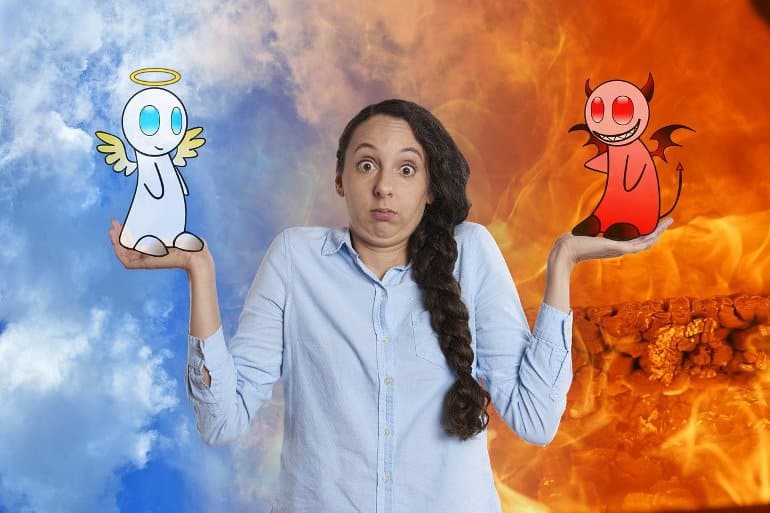Summary: People’s beliefs about good and evil supernatural agents are influenced by how they view their fellow humans and human behavior.
Source: University of Waterloo
What transpires in comedies and cartoons when a character has a devil on one shoulder and an angel on the other is not far off from people’s perceptions of the real world, finds a new study from the University of Waterloo.
Intended to illustrate the characters’ decision-making dilemma with comedic results, the moral character and motives of the supernatural beings are obvious. And people have similar expectations when it comes to individuals they see as good or bad.
The researchers explored expectations about how good and evil individuals respond to requests. The researchers were interested in understanding why movies and folktales often depict the devil and demons as eager to grant accidental requests, whereas angels are not depicted this way.
Their study indicates that people’s beliefs about good and evil characters are influenced by their views of ordinary humans.
“Our results suggest people expect good agents will be sensitive to intentions behind requests whereas they expect evil individuals will be relatively insensitive to these intentions,” said Ori Friedman, developmental psychology professor at Waterloo and lead author of the study. “These findings shape people’s expectations about requests directed both to regular humans and to supernatural agents.”
The study shows that people have distinct ideas of how being good or bad influences the decisions of others. People assume that evil individuals are indifferent about anything that doesn’t directly impact their own aims.
These findings support previous research in suggesting that at least some of people’s everyday beliefs about supernatural beings could be based on their views of humans.

“One aspect of seeing someone as evil might be that we expect that person to put less emphasis on the intentions of others, and instead focus more on the outcome of people’s actions,” says Brandon Goulding, a PhD candidate in developmental psychology and co-author of the study.
“Whereas we think that a good person will also consider what someone meant to do, and weigh that against what they actually did.”
Researchers investigated people’s expectations about good and evil agents with five experiments. In the study, 2,231 participants read short stories about a protagonist’s request to either a human or supernatural being and rated the likelihood the request would be granted. When the request was directed to someone good, ratings depended on whether the requester actually understood what they were requesting. Evil individuals were expected to grant requests just as often when they were confused and didn’t reflect the requester’s intentions.
“This research tells us something very interesting about how people view good and evil, which is that people don’t just think that evil agents focus exclusively on causing harm. Instead, people relate evil to being indifference and to not caring about what people want,” Friedman said. “It also suggests that people think moral goodness is about more than producing good outcomes. People also see moral goodness as being connected with caring about what people want and intend.”
About this psychology research news
Author: Press Office
Source: University of Waterloo
Contact: Press Office – University of Waterloo
Image: The image is in the public domain
Original Research: Closed access.
“Butt-dialing the devil: Evil agents are expected to disregard intentions behind requests” by Rebecca J. Dunk, Brandon W. Goulding, Jonathan A. Fugelsang, Ori Friedman. Journal of Experimental Social Psychology
Abstract
Butt-dialing the devil: Evil agents are expected to disregard intentions behind requests
Evil supernatural beings are often depicted as responding to unintended requests, whereas this may be less common in representations of good supernatural beings. This asymmetry suggests that people may expect good and evil agents to differ in their sensitivity to other people’s intentions. We investigated this proposal across five experiments on 2231 adult US residents.
In Experiments 1 to 4, participants judged whether good or evil agents would grant requests from individuals who varied in their understanding of what they requested, and in whether they executed requests correctly. Across experiments, the good and evil agents were either supernatural beings or regular humans. Participants predicted good agents would be sensitive to intentions behind requests, but predicted evil agents would be comparatively insensitive to these intentions. In some experiments, they also predicted that evil agents would be more sensitive to whether requests were executed correctly. In Experiment 5, participants rated explanations for why an agent would grant a request from someone who did not understand what they were requesting.
Participants thought evil agents might grant such requests because they are indifferent to the others’ intentions, but participants did not strongly endorse this explanation for good agents. Taken together, our findings suggest that people have distinct expectations of how moral character affects decision-making.
They also suggest that people’s beliefs about good and evil supernatural beings may be grounded in their views of ordinary humans.






